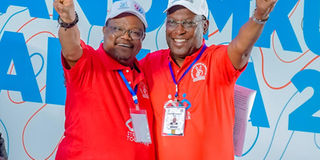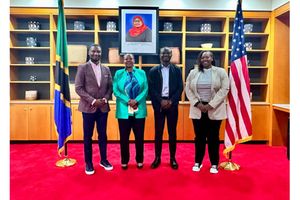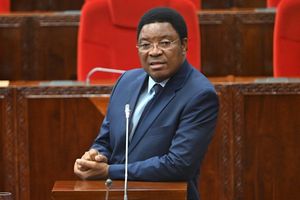Chadema election offers lessons for Tanzanian political parties

Chadema candidates for the national chairmanship position before the election on January 21 Freeman Mbowe (right) and Tundu Lissu. Mr Lissu emerged victorious, replacing Mr Mbowe, who served in the position for 21 years. Photo | Courtesy
What you need to know:
- While the election demonstrated a commitment to democratic principles with a fair and transparent process, it also highlighted the challenges of internal party elections, including mudslinging, the public airing of internal party matters, and the potential for internal divisions
Dar es Salaam. Analysts have identified commendable practices and critical challenges arising from Chadema’s recent national leadership election, providing valuable insights for other political parties in Tanzania.
The election, held on January 21 this year, marked the conclusion of Freeman Mbowe’s 21-year tenure as national chairperson.
Tundu Lissu, former vice chairperson for Tanzania mainland and the party’s 2020 presidential candidate, triumphed in a highly competitive race against Mr Mbowe and other senior figures.
The election process was widely regarded as transparent and fair, showcasing Chadema’s commitment to democratic principles. Nonetheless, analysts noted that the campaigns were tainted by instances of mudslinging and public exposure of internal party matters, prompting concerns about long-term divisions within the party.
Analysts emphasise that the election provides lessons on both what to emulate and what to avoid when organising internal elections, especially at the national level.
One of the most lauded aspects of the election was its transparency. Unlike many internal party elections in Tanzania, the process unfolded without reports of bias, interference, or complaints of rigging—a rarity that sets a high standard for political parties aspiring to foster internal democracy.
According to Prof Makame Ali Ussi from the State University of Zanzibar, this level of fairness is commendable.
“Chadema demonstrated that it is possible to conduct a fair election where all candidates feel heard and valued, fostering trust among members and strengthening the party’s legitimacy,” he stated.
Another praiseworthy element was the peaceful transition of leadership. Freeman Mbowe, who led the party for over two decades, stepped aside gracefully—a rarity in Tanzania’s political culture. Analysts highlighted his willingness to contest the election and accept its outcomes as a testament to his commitment to the party’s principles.
Dr Onesmo Kyauke, a political scientist from the University of Dar es Salaam, noted: “Leadership transitions often cause rifts in political parties. However, Chadema has exemplified that these transitions can be handled with dignity and respect.”
Despite these positives, the election unveiled significant flaws. Campaigns were marred by accusations of mudslinging, with candidates engaging in personal attacks rather than focusing on policies and strategies. Analysts caution that such divisive rhetoric can create long-lasting scars and fractures that may persist long after the elections.
As Dr Kyauke suggested: “Political parties must find ways to regulate their internal campaigns to prevent damaging relationships within the party.”
Public disclosure of sensitive party matters during the campaigns added to the concerns. Analysts argue that airing internal disputes publicly can undermine the party’s credibility and expose it to political volatility.
"Internal party issues should remain internal,” asserted Prof Ussi. “Revealing these matters in public not only damages the party’s reputation but also weakens its unity.”
Timing also emerged as a critical concern. Conducting a national election in the same year as a general election creates significant challenges for new leadership, which now faces the pressing task of preparing for the 2025 elections.
Analysts have suggested that parties should consider scheduling their internal elections earlier to allow adequate preparation time. Dr Paul Loisulie from the University of Dodoma remarked, “Chadema’s decision to hold its election in a general election year has placed substantial pressure on the new leadership. Poor timing can have serious repercussions.”
Besides timing, communication strategies emerged as another area for improvement. Political parties often fail to engage their members and supporters effectively during leadership transitions, leading to misunderstandings and disputes.
Chadema’s experience underscores the importance of clear communication before, during, and after elections to ensure all stakeholders understand the processes and outcomes.
“Effective communication goes beyond announcing results; it involves engaging members throughout the process and promptly addressing their concerns,” explained Dr Loisulie.
The election also highlights the importance of leadership qualities in fostering unity within parties after contentious contests.
Analysts assert that newly elected leaders must prioritize healing divisions and promoting cohesion to prevent fragmentation.
Mr Lissu, Chadema’s new chairperson, faces the significant task of uniting a party that experienced intense debates and disagreements during the electoral process.
Dr Kabobe noted: “Leadership is about bringing people together, especially post-election. Tundu Lissu must prioritise mending any rifts within Chadema to prepare the party for the 2025 general elections.”
Moreover, Chadema’s election has sparked discussions on the balance between transparency and discretion in party affairs. While transparency is essential, it must not compromise the party's stability or reputation.
“Managing the flow of information shared publicly while securing sensitive internal issues is vital,” cautioned Prof Ussi.
Lastly, the role of external observers in enhancing electoral credibility emerged as an important takeaway from Chadema’s election. Analysts propose that involving independent observers, even informally, can build trust and reduce accusations of bias.
"External observers can add a layer of accountability, reassuring members that the process is fair. This is a practice many Tanzanian parties should adopt,” suggested Dr Loisulie.
In conclusion, while challenges remain, Chadema’s election stands as a significant milestone in Tanzania’s political landscape. It demonstrates that it is possible to conduct an internal election with respect and fairness, setting a benchmark for other parties during their leadership transitions.
To avoid similar pitfalls, parties are encouraged to implement measures regulating campaign behaviour, ensuring a focus on collective goals, fostering dialogue among competing factions, and safeguarding sensitive party information.
Dr Kabobe summarised the lessons learnt: “The takeaways from Chadema’s election are clear: fairness, respect, and unity must be integral to every party’s internal elections.”





